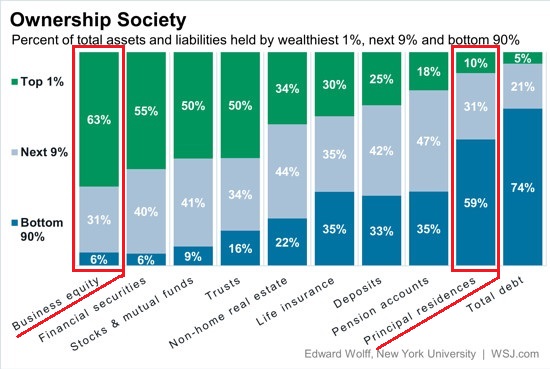Reinventing Democracy
 | Reinventing Democracy The whole point of democracy and free markets is to force competition on elites who are desperate to eliminate competition. What's the point of discussing reforms that aren't even possible in the current status quo? That's a good question, as any discussion of major systemic changes can be dismissed as pointless (since they'll never be adopted), and a distraction from the "real work" that can be managed within the current system. On the other hand, we might ask: what's the point of discussing what is do-able in the status quo, i.e. superficial feel-good policy tweaks that change nothing in the power structure? In other words, everything is ultimately a superficial feel-good policy tweak if it doesn't change how power, "money," credit and resources are amassed and distributed. The argument for discussing "impossible" systemic changes is this: we must ponder other ways to structure who has power for two reasons: 1) to validate how far we descended into neofeudalism and neocolonialism, and thus how desperately we need to re-arrange the power structure, and 2) to explore different models of governance and economic incentives, with an eye on the value of competition between ideas and systems. Richard Bonugli and I discuss ways to restore or reinvent democracy in our recent podcast, The Roundtable Insight Vision Series: Democracy (29:36). Although this sounds cynical, it isn't: democracy is not really about self-rule, it's about keeping an elite-run system stable by institutionalizing a safety valve and a governor on elite greed, corruption and mismanagement. Democracy gives the rabble a restricted voice as a means of limiting elite misrule, which is the natural path taken by elites everywhere, in all eras. The elite echo-chamber is: we're entitled (by birth, rights granted by the gods, superior intelligence, merit, etc.) to rule, and therefore whatever we decide is wise--even if it is self-serving and delusional. Other models of governance rely on competition between elites to keep whichever elite is currently dominant from destroying the whole arrangement via their hubris, narcissism, greed, corruption, stupidity, delusions of grandeur and all the other pathologies of power. These models tend to fail because the dominant elite tends to see eliminating competitors as a very good strategy for consolidating power--just like corporations always seek monopolies or cartel arrangements to eliminate the pesky risks of open competition--which as we all know, introduces the possibility of losing, which a bad thing. To eliminate the possibility of losing, eliminate competition: what an excellent solution! This is why "capitalism" isn't really about free markets, any more than colonialism is about "civilizing the natives;" it's all about eliminating competition and rigging markets. In this way, "capitalism" and democracy are a perfect partnership, as each claims a noble cloak to obscure the actual machinery of elite self-service. The strength of democracy in system terms is it introduces a feedback loop that serves to limit systemically dangerous extremes, for example, a dictatorship that requires everyone to wear their underwear on the outside of their clothing, or (ahem) a system like ours that has boiled away social mobility and financial security, leaving a rapaciously exploitive machine that feeds off persuading poor people to borrow even more money to convince themselves that they're not poor and powerless. The wealthy own the income-producing capital, the poor "own" debt: the wealthy own the mortgage / auto loan / student loan, the poor owe the mortgage / auto loan / student loan. Funny how neofeudalism works: the financial aristocracy is in the castle, protected by the Central State, and the debt-serfs are toiling away down there, protected by, well, no one. But by all means, vote for your favorite actor on the tawdry side-stage erected to amuse the public: what flourishes, what emotion, what comedy. (Please pardon the outburst of "truthiness." I'll try not to let it happen again.) If democracy is boiled away, the only pressure-relief valve and governor-on-greed left is messy uprising or a messy uprising plus the wholesale abandonment of the status quo by the technocrat class that keeps the whole thing glued together (what I call opting out). The prime directive in governance is to always, always, always centralize power to extend the reach of the elite currently at the wheel, and to limit the number of grubby hands trying to reach the wheel. Centralizing political power makes life considerably easier for elites, as they only need to bribe, blackmail or persuade a handful of folks at the top to cement their power / monopoly /cartel. I discuss this in my book Resistance, Revolution, Liberation. Consider the difficulties of cementing a quasi-monopoly on banking if banking were restricted to the county level. The would-be cartel grifters would have to bribe, blackmail or persuade 3,000+ county councils, all of whom are far closer to voters and far more exposed to competition than federal regulators or the Federal Reserve or Congress-critters, who as we all know, are re-elected like clockwork except in a few cases that are basically signal noise. This illustrates the value of Subsidiarity in a democracy, with Subsidiarity defined as "the principle that a central authority should have a subsidiary function, performing only those tasks which cannot be performed at a more local level." The Subsidiarity principle only works in a democracy if capital is also democratized. What's conveniently forgotten or left unsaid is: capital always "votes" three times. 1) Capital's beneficiaries, allies and employees will vote to keep their gravy train running; 2) Capital influences the public with ad campaigns and public relations, all of which are quite affordable; 3) Capital influences the political / regulatory power players in private, a.k.a. lobbying, revolving doors between corporations and the political/regulatory agencies, junkets, farcically bloated speaking fees, etc. The only possible conclusion: if we don't democratize capital, democracy is boiled away. I wish this could be sugarcoated, but it's much like my other aphorism: if we don't change the way money is created and distributed, we've change nothing. In other words, if we don't change the money/credit system and democratize capital, then all we'll ever have is more superficial feel-good policy tweaks: all sound and fury, signifying nothing. There are ways to re-structure the system to restore / reinvent democracy. Ellen Brown has made a persuasive case for public / community banking for many years, and the same idea can be applied to private-sector companies: How Community Companies Can Smash Monopolies (via Sadie). It seems impossible at this point to decentralize power and capital, but with the pressure-relief valve and governor-on-greed of democracy both disabled, the system is starting to shake apart at the seams. I've often discussed the various classes and elites jostling for power in the U.S., and it's possible some elite might awaken to the necessity to restore the possibility that those with the vast majority of wealth and power might actually lose, i.e. restore real competition in the economy and our system of governance. This competition starts with the competition of ideas. That's the point of our discussion on Democracy (29:36), which covers many other interesting ideas for decentralizing / reinventing democracy. Where to start? Here: the whole point of democracy and free markets is to force competition on elites who are desperate to eliminate competition.  (via K.K.)   |
Source: OfTwoMinds
Comments
Post a Comment